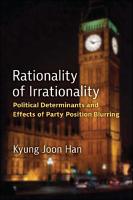Rationality of Irrationality
External Review of Whole Manuscript
Political Determinants and Effects of Party Position Blurring
Abstract
Citizens in democracies complain that political parties’ positions on major issues are too ambiguous for them to confidently understand. Why is party position ambiguity so common? Are party positions ambiguous because political parties fail in forming clear policies or because they deliberately blur their positions? Rationality of Irrationality argues that political parties are motivated to strategically blur their position on an issue when they struggle with a certain disadvantage in the issue. Specifically, political parties present an ambiguous position when their own supporters are divided in their stances on the issue. A political party also blurs position stances when voters do not acknowledge that the party has the ability and integrity to solve problems related to the issue. Political parties blur their position in these cases because ambiguous party positions divert voters’ attention from the issue. Voters support a political party whose policy positions on major issues are close to their own stances. However, voters cannot confidently and exactly estimate party positions on an issue when they are only ambiguous.
Keywords
Party politics, Party position, Party competition, Position blurring, Position ambiguity, Ambiguous party position, Vague party position, Western Europe, Social democratic party, Radical right-wing party, Issue competition, Issue emphasis, Issue salience, Polarization, Party supporter division, Issue competence, Immigration, Responsible party model, Personalization of politics, Manual workerDOI
10.3998/mpub.11989496ISBN
9780472075539, 9780472055531, 9780472902910Publisher
University of Michigan PressPublisher website
https://www.press.umich.edu/Publication date and place
2022Classification
Politics and government
Political parties and party platforms


 Download
Download Web Shop
Web Shop